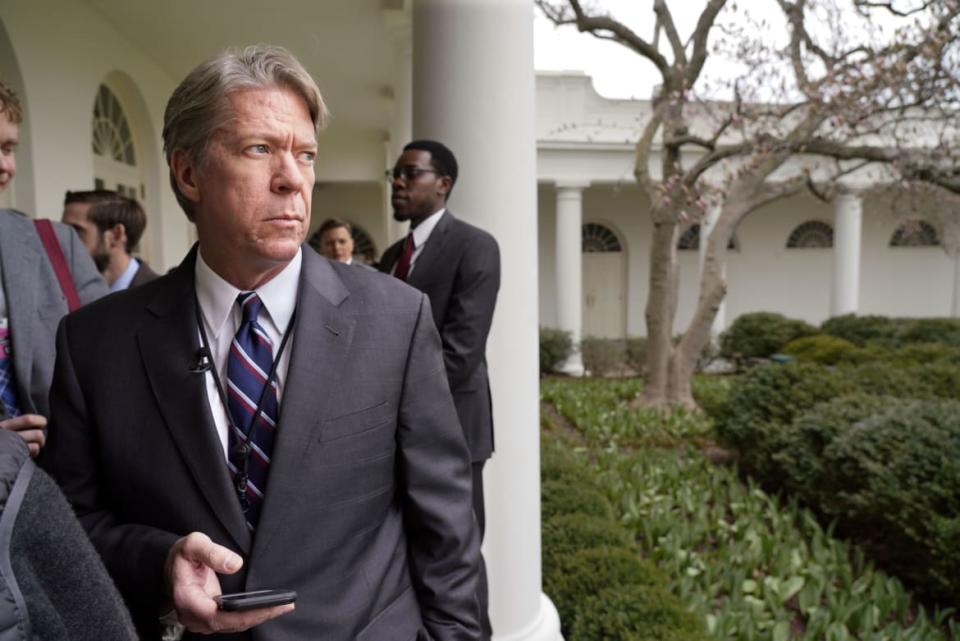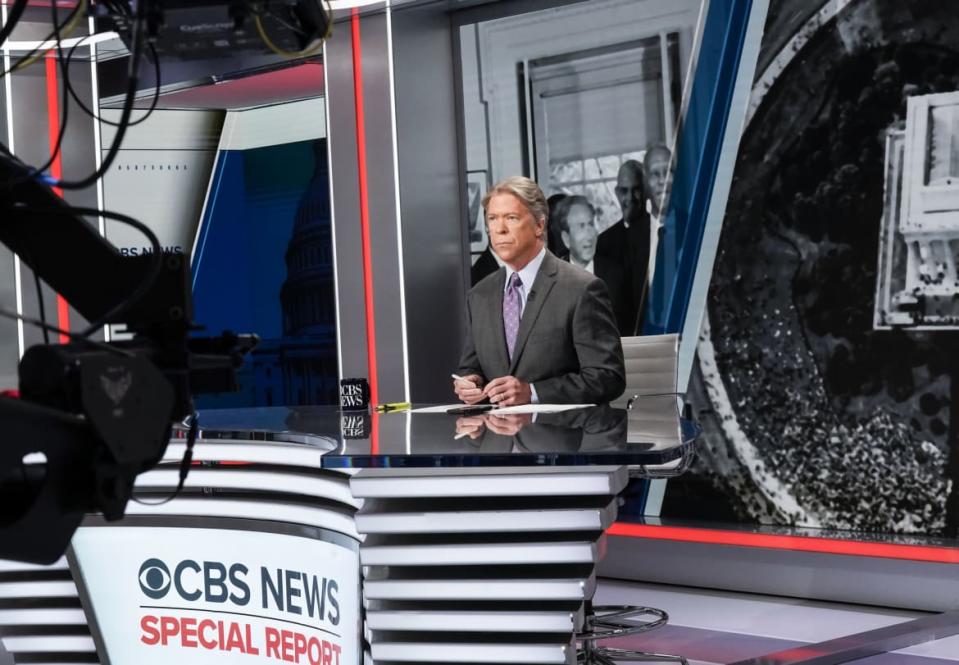CBS Star Reporter Fears We’re on the Brink of Civil War

In the books written about the plot to steal the 2020 election and the violent insurrection that followed, none have led with a 50-year-old high school teacher from Bucks County, Pennsylvania, afraid of a civil war.
“This is not something I’ve seen in the history of this country, except for before the Civil War,” said Bob Harvie, the chair of the Bucks County Board of Elections, in the pages of The Big Truth, the new book from CBS News star Major Garrett and elections expert David Becker. “And it does scare me. I’m really worried we’re approaching a precipice that’s going to be impossible to come back from.”
It’s people like Harvie who Garrett, the chief White House correspondent at CBS News, and Becker, the head of the Center for Election Innovation & Research, hoped to spotlight in their new book, The Big Truth: Upholding Democracy in the Age of “The Big Lie,” due out Tuesday from Diversion Books.
The at-times distressing book tells the story of how democracy survived an unprecedented assault in 2020, often through the election officials who served as its soldiers. Featuring interviews with those in several pivotal states, lawmakers who fought to defend the election (and paid the electoral price for it), and political historians, the 283-page account reflects on the impact of the attack and how best to prevent it in the future.

"WASHINGTON - MARCH 6: CBS News' chief White House correspondent Major Garrett at the White House in March 2018. (Photo by Chris Usher/CBS via Getty Images)"
The idea for the book came just after the 2020 election, though it was rooted in both Garrett and Becker’s experiences in the months prior. The COVID-19 pandemic left Garrett unsure of how to do campaign reporting, particularly when no events or rallies were being held (to a certain extent). It led him to focus instead on how the election would be carried out, particularly as Donald Trump and his acolytes again laid the foundations to claim a “rigged” election. After the election, Garrett approached Becker, who served as CBS News’ election law expert, with the basic outline.
“It was almost like the D-Day of elections,” Becker told The Daily Beast in a recent Zoom conversation with the pair. “American ingenuity and hard work—from liberal Democrats to conservative Republicans, from Alaska to Florida—paid off, and we somehow managed 160 million voters while 1,000 people were dying a day from a pandemic. And that story wasn’t being told.”
Its necessity, however, became apparent after the Capitol riots, which seemed to serve as a culmination of a months-long, anti-democratic barrage.
“After Jan. 6, David and I assumed that that would be the ultimate moment in which everyone would have said, ‘This is the abyss and we will all walk back from this abyss in a bipartisan way,’” Garrett said. “By the summer, it was clear that wasn’t happening, that there was already a recasting and a whitewashing of what Jan. 6 was, and a concerted effort by some Republicans, and certainly former President [Donald] Trump, to deny there was anything really wrong with Jan. 6.”
The book serves, in their words, as a “meditation” on the Machiavellian plot, along with how such a scheme could be concocted.
Americans Are Too Pampered and Neurotic to Fight a Civil War
It opens with alternate Januarys in both 2023 and 2017, offering ideas of what the U.S. could or could have looked like had either Democrats employed the same tactics Republicans had after Hillary Clinton lost in 2016 or if Texas chooses to effectively secede if House Democrats waver on seating its delegation in the 2022 midterms.
The portrayals are dramatic, if a tad alarmist, answers to the question: What could serve as the genesis of a modern-day civil war?
The idea was to outline the worst-case scenarios in each of those contexts by referencing what had already happened, particularly as Texas had enacted laws directly in response to the Big Lie. Garrett said his first attempts at writing the chapters were even more climactic, requiring Becker to rein him in. “We didn’t want to terrify people,” Garrett said.
However, both conceded that the written accounts were not too far off from reality.
“We wanted to show people that what we're talking about is just incremental steps from where we already are,” Garrett said. “I don’t think anyone reading that first chapter can honestly say, ‘Oh, that could never happen.’ They have to say, ‘Holy crap, we’re 85 percent there.’”
The book does cover some well-worn territory, featuring interviews with outspoken Jan. 6 committee members Jamie Raskin (D-MD), Zoe Lofgren (D-CA), and Liz Cheney (R-WY), along with Georgia Secretary of State Brad Raffensperger.

"WASHINGTON - AUGUST 28: CBS News chief Washington correspondent Major Garrett will provide live exit poll analysis, report on any voter integrity issues, and more on Election Night 2020 coverage. (Photo by Michele Crowe/CBS via Getty Images)"
But it also roots itself in historical context, noting how elections were run in the past, how they persisted, and how that was tested in 2020. It examines past close calls, noting the tight election between John F. Kennedy and Richard Nixon; the public and legal spat between George W. Bush and Al Gore; and even some House Democrats objecting to certifying Trump’s win in 2017. It also examines the rhetoric and social media posts that stoked the flames of voter fraud and election irregularities, whether domestically or foreign-sourced.
The goal was to highlight all possible examples the people who questioned the election often cited, hoping to contextualize—and not excuse—them to show how it didn’t mean the election was rigged.
“You might have reasonable questions. Fine. We don’t discourage reasonable questions, and we don't patronize those who have them,” Garrett said. “We try to write it in the spirit to say, ‘Fine, that’s OK. Not only do we not condemn you, we’re here for you.’ Because ultimately, David and I believe that there are far more people of goodwill and good faith in this country who, if they just step back a stride or two, will come to a different conclusion.”
One element the two do not examine at all, however, is the role that media—particularly the powerful right-wing media ecosystem—played in elevating some of the wildest claims to the mainstream. Fox News and sister network Fox Business often touted many of the Trump campaign’s lies shortly after the election, even as the network’s own decision desk confirmed Trump’s loss. Those were further amplified by Fox impressionists Newsmax and One America News, where viewers often flocked—sometimes with Trump’s encouragement—when Fox became insufficiently pro-Lie.
These outlets also featured guests who attacked Mark Zuckerberg’s multi-million-dollar donations to election organizations, including Becker’s Center for Election Innovation & Research, as “Zuckerbucks” that swayed the election in Biden’s favor—even when grants were distributed to states both Biden and Trump won.
Trump’s Gone Full QAnon. There’s No Point in Denying It Anymore.
Trump-endorsed candidates have still tried to push those lies on Fox. Arizona gubernatorial candidate Kari Lake notably fought with news anchor Bret Baier in June over his refusal to cover the outlandish and discredited 2,000 Mules documentary, which falsely claims Democrats illegally paid people to dump ballots in pivotal states to swing the election.
All three networks were later sued for defamation by voting system operators Dominion Voting Systems and Smartmatic, frequent villains of their coverage. The lawsuits emphasized the impact of their coverage in undermining confidence in the election, making the two authors’ decision to not examine conservative media’s influence all the more questionable.
But Garrett defended the decision, arguing the two—including Garrett, who has been in the media for roughly 30 years—were better positioned to focus on the election processes instead of the media players that often tore them down.
“Just to stay in our lane,” he said. “We don’t name and we don’t sift, because trust me, as you well know, sifting all of the various things that are conspiratorial or wacky in that space can take up a tremendous amount of time. And we just sort of wanted to be a little bit elevated above that.”
Garrett, who served as Fox News’ senior White House correspondent until he left in 2010, did acknowledge his former employer’s complicity in allowing lies to run rampant.
“It was a remarkable event for me to see the network attack its own decision desk, because I knew, based on my experience—12 years previous, so a lot of water had gone under the bridge—but it seemed to me that that decision desk was just as good as it had been when I was there,” Garrett said. “So all of that was remarkable to me, in the truest sense of the word.”
How Fox News Primetime Jacked Up Trump’s ‘Big Lie’
He said the verdict on whether Fox can be salvaged will depend on its various election-related lawsuits. “Both litigants suing Fox have made it clear: They are not afraid of discovery, their systems will be opened,” Garrett said. “That tells me something about their orientation to what they do and how they do it. And whatever remedial steps will be taken, if they will be taken, will come as a result, I suspect, of that discovery process.”
In its totality, though, the book is a “love letter to election officials” who protected the election from those attacks, whether from the media, campaign officials, or the former president himself. Becker noted how they were forced to operate those elections in person, even as COVID-19 left them sick, due to the nature of the job. “They do it not because it’s a job, but because it’s a calling,” Becker said.
“They deserve a book that explains just how great a thing they accomplished in a moment of maximum personal peril, and the grips of a pandemic,” Garrett concurred. “This love letter became a much bigger meditation, but it's still a love letter, and they deserve it.”
Got a tip? Send it to The Daily Beast here
Get the Daily Beast's biggest scoops and scandals delivered right to your inbox. Sign up now.
Stay informed and gain unlimited access to the Daily Beast's unmatched reporting. Subscribe now.


